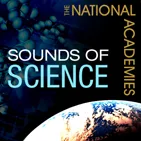
The Sounds of Science from the National Academies
This informative and entertaining biweekly series of audio podcasts puts the spotlight on the high-impact work of the National Academies. Focusing on a wide range of critical issues in science, engineering, and medicine, these short 10-minute episodes are a quick and easy way to tune in to all the key findings and important recommendations made by the Academies.
- Update frequency
- every 10 days
- Average duration
- 10 minutes
- Episodes
- 117
- Years Active
- 2007 - 2010

Abrupt Climate Change: Inevitable Surprises
The climate record for the past 100,000 years clearly indicates that the climate system has undergone periodic and often extreme shifts, sometimes in as little as a decade or less. The causes of abru…
00:14:28 |
Fri 18 May 2007

Treating Infectious Diseases in a Microbial World
Humans coexist with millions of harmless microorganisms, but emerging diseases, resistance to antibiotics, and the threat of bioterrorism are forcing scientists to look for new ways to confront the m…
00:13:04 |
Tue 08 May 2007

Managing Coal Combustion Residues in Mines
Burning coal in electric utility plants produces, in addition to power, residues that contain constituents which may be harmful to the environment. The management of large volumes of coal combustion …
00:06:47 |
Fri 04 May 2007

Organ Donation: Opportunities for Action
Rates of organ donation lag far behind the increasing need. At the start of 2006, more than 90,000 people were waiting to receive a solid organ (kidney, liver, lung, pancreas, heart, or intestine). O…
00:10:09 |
Fri 27 Apr 2007

Children's Health, The Nation's Wealth: Assessing and Improving Child Health
Children's health has clearly improved over the past several decades. Significant and positive gains have been made in lowering rates of infant mortality and morbidity from infectious diseases and ac…
00:10:41 |
Fri 20 Apr 2007

Beyond Bias and Barriers
Beyond Bias and Barriers explains that eliminating gender bias in academia requires immediate overarching reform, including decisive action by university administrators, professional societies, feder…
00:12:01 |
Fri 13 Apr 2007

Reducing Underage Drinking: A Collective Responsibility
Reducing Underage Drinking: A Collective Responsibility drinking, the greater the danger. This Podcast presents strategies for state-level leadership, community mobilization, and restricting youth ac…
00:10:42 |
Fri 06 Apr 2007

From Neurons to Neighborhoods: Applying the Science of Early Childhood Development
There has been an explosion of knowledge in understanding the infant brain and in pinpointing the factors that influence whether young children get off to a promising or a worrisome start. This Podc…
00:15:58 |
Tue 27 Mar 2007

Tech Tally: Approaches to Assessing Technological Literacy
Technology is pervasive; an informed citizenship needs to know what technology is, how it works, how it is created, how it shapes our society, and how society influences technological development. Th…
00:10:07 |
Fri 23 Mar 2007

Engaging Schools
When it comes to motivating people to learn, disadvantaged urban adolescents are usually perceived as a hard sell. Yet, in a recent MetLife survey, 89 percent of the low-income students claimed I rea…
00:09:05 |
Fri 16 Mar 2007

Commuting in America III
The average daily commute to work is taking longer now than it has in the past. This synopsis of the Commuting in America III report provides an overview of some of the major trends and factors bein…
00:11:48 |
Fri 09 Mar 2007

Understanding the Ocean's Role in Human Health
The ocean has greater affects on human health than the average person realizes. This report brief discusses the health and medical hazards, benefits, and potential found in the ocean's depths.
00:12:11 |
Fri 02 Mar 2007

Genes, Behavior, and the Social Environment
We have made great strides over the past century in reducing rates of disease and enhancing people's general health. This report brief discusses the findings and recommendations from the Institute o…
00:10:47 |
Fri 02 Mar 2007

Learning to Think Spatially
Spatial thinking is a skill used in everyday life, the workplace, and science to solve problems using concepts of space, visualization, and reasoning. This report brief looks into the importance and…
00:10:46 |
Fri 02 Mar 2007

Stem Cells and the Future of Regenerative Medicine
Stem cells are the primitive cells that give rise to the different tissue types in the body. This podcast provides a summary of the issues surrounding stem cell research, including the debate, the t…
00:07:51 |
Fri 02 Mar 2007

Preventing Medication Errors
Most of the time medications are beneficial, or at least they cause no harm, but on occasion they do injure the person taking them. This report brief highlights the findings and recommendation from…
00:11:54 |
Fri 02 Mar 2007

Where the Weather Meets the Road
Where the Weather Meets the Road: A Research Agenda for Improving Road Weather Services, a National Academies report, recommend that the Federal Highway Administration take the lead in creating a coo…
00:10:27 |
Fri 02 Mar 2007
Disclaimer: The podcast and artwork embedded on this page are the property of The National Academies. This content is not affiliated with or endorsed by eachpod.com.